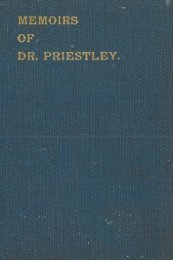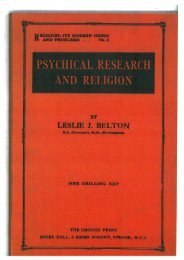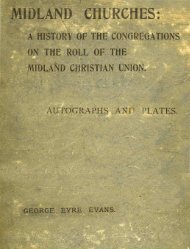Essays in Unitarian Theology by Kenneth Twinn Lindsey - General ...
Essays in Unitarian Theology by Kenneth Twinn Lindsey - General ...
Essays in Unitarian Theology by Kenneth Twinn Lindsey - General ...
You also want an ePaper? Increase the reach of your titles
YUMPU automatically turns print PDFs into web optimized ePapers that Google loves.
ESSAYS IN UNITARIAN THEOLOGY<br />
as the meta~hor for the various cc levels " of God's self-<br />
A<br />
revelation through his " creation ". My pronoun for<br />
God, therefore, is " he ", not because of any implied<br />
mascul<strong>in</strong>ity, but because of a lack of s<strong>in</strong>gular pronoun<br />
of common gender <strong>in</strong> English: grammatically, this<br />
would not arise <strong>in</strong> Hungarian and some other languages,<br />
which do not differentiate <strong>in</strong> gender, but<br />
metaphorically it is present <strong>in</strong> all monotheistic thought.<br />
Short of a deliberate manufacture of a requisite pronoun,<br />
the only solution is to submit to monotony and<br />
treat " God " as both noun and pronoun.<br />
While it is always dangerous to draw logical conclusions<br />
from purely poetical expressions, it is, I feel,<br />
legitimate to affirm that God's " possession of personality<br />
" has a great significance for my relationship to<br />
him; and this further <strong>in</strong>validates the use of " universe<br />
" or cc reality " <strong>in</strong> this connexion. There enters<br />
here a profound dist<strong>in</strong>ction between my relationship<br />
with God and that with the whole universe except<br />
man, <strong>in</strong> which I can f<strong>in</strong>d no personality. Therefore<br />
I cannot equate or identify God with the universe, but<br />
c c<br />
can regard the universe only as an expression " or<br />
cc garment " of God. The further dist<strong>in</strong>ction between<br />
my relationship with God and that with man lies <strong>in</strong> the<br />
" creaturel<strong>in</strong>ess " (to use von Hugel's term) of man.<br />
Otherwise, there is a close similarity, which allows a<br />
wealth of imagery from human relationships to represent<br />
the div<strong>in</strong>e-human relationship. Jesus described<br />
God as " Father ", and, understood figuratively and<br />
poetically, without the limitations of gender (for<br />
cc parent " lacks the same emotional associations), this<br />
term has not been bettered,<br />
A PERSONAL AFFIRMATION<br />
Man<br />
The implication follows, likewise, that man is<br />
" child of God ". He is this <strong>by</strong> virtue of that part of<br />
his nature which we designate as " spiritual ", i.e., <strong>by</strong><br />
which he is enabled to perceive truth, love and create<br />
beauty, and seek and do good, or, <strong>in</strong> a word, to make<br />
value-judgements and to act <strong>in</strong> their light. This it is,<br />
like his capacity to record and communicate (speech,<br />
writ<strong>in</strong>g, etc.), which is, however, a concomitant of the<br />
former faculty, that differentiates him from all other<br />
liv<strong>in</strong>g be<strong>in</strong>gs so far known to him. The possibility<br />
that he may share this capacity with be<strong>in</strong>gs on some<br />
other planet <strong>in</strong> this or some other solar system, though<br />
it may have other implications, does not <strong>in</strong>validate the<br />
-<br />
fact. Insofar as he can make such value-judgements,<br />
man is free; his perception of truth, appreciation of<br />
beauty and understand<strong>in</strong>g of goodness may be rela-<br />
tively undeveloped or clouded <strong>by</strong> his personal circum-<br />
stances or impulses from his complex nature; and his<br />
action may be likewise <strong>in</strong>fluenced But the act of will<br />
aris<strong>in</strong>g out of his value-judgement is free. There<strong>in</strong> lies<br />
the possibility of s<strong>in</strong>, for to s<strong>in</strong> is to refuse to act <strong>in</strong><br />
accordance with the highest one has conceived, whether<br />
-<br />
deliberately or <strong>by</strong> allow<strong>in</strong>g such <strong>in</strong>fluences as I have<br />
mentioned to sway one's choice. The s<strong>in</strong> is not the<br />
act <strong>in</strong> itself but the disposition with<strong>in</strong> that leads to the<br />
act. Individual human be<strong>in</strong>gs are at different levels<br />
of spirituality, from the seers and the sa<strong>in</strong>ts to the<br />
savages and the perverts; and all act at different<br />
levels at different times. So that all men are s<strong>in</strong>ners,<br />
but many act on occasion like sa<strong>in</strong>ts or " almost like "<br />
sa<strong>in</strong>ts. Every man is as complex spiritually as he is<br />
B






